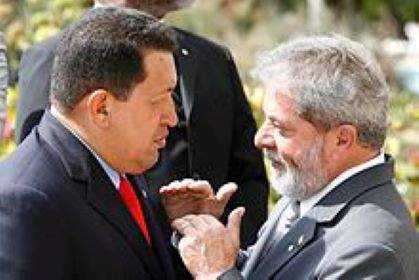China - Brazil Does BRICS
Monday, May 1, 2023
Written by Laurence F Sanford, Senior Analyst ASCF
Categories: ASCF News ASCF Articles

Suddenly, it seems, the United States is surrounded by Marxist-led countries throughout the entire Western Hemisphere. Ernest Hemingway’s famous quotation - “How did you go bankrupt? Two ways. Gradually, then suddenly.” best describes the Marxist encirclement that suddenly appeared around the USA. Brazil’s 2022 election of President Lula is the latest and most significant domino, as Brazil is the largest Latin American country in size, population, and economic strength.
In 2021 CIA Director William J. Burns went to Brazil and told the U.S. and Trump-friendly Bolsonaro government not to “mess” with the next Brazilian election. There were no media announcements of Burns telling candidate Luiz Inacio Lula de Silva (Lula) not to “mess” with the election. (The CIA should have been offering assistance to Bolansaro to help defeat the anti-American Lula).
Lula won the October 2022 election in a stunning comeback after serving jail time for corruption during his previous presidency. Bolsonaro’s followers demonstrated against the election results as being rigged, but to no avail. But as usual, the media and “useful idiots” turn a blind eye to communists rigging elections. Former U.S. President Jimmy Carter said in 2013 that Venezuela’s election process was the “best in the world” as his friend Marxist Hugo Chavez won another rigged election.
Brazilian President Lula visited China in April 2023, shortly after his January 2023 inauguration. He signed over 20 new bilateral agreements to strengthen relations between China and Brazil. The Brazilian president was accompanied by a large contingent of business and political leaders seeking to normalize Chinese relations after four years of pro-American Brazilian President Bolsonaro.
While in China, Lula visited Shanghai and the New Development Bank (NDB) headquarters. It was founded by the trading bloc BRICS, an acronym for Brazil, Russia, India, China, and South Africa. BRICS openly states a desire to replace the U.S. dollar as the world’s reserve currency. With the exception of India, all BRICS countries are anti-American and authoritarian.
The purpose of the NDB is to provide development loans to member countries by moving away from the US dollar and utilizing local currencies. China and Brazil have agreed to trade in local currencies --- the Chinese yuan and the Brazilian real. (Argentina on April 24 announced it will now pay for its Chinese imports with the yuan to preserve its dwindling U.S. currency reserves).
Lula was present for the inauguration of the new NDB president, former Brazilian President Dilma Vana Rousseff. She is a political ally of Lula, a former Marxist guerilla, and was impeached for corruption while president.
While in Shanghai, Lula also visited Huawei’s innovation center. Huawei has been designated a national security threat by the U.S. Federal Communications Commission but has had a presence in Brazil for 25 years and recently won a contract to install 5G equipment.
China has been the number-one trading partner for Brazil since 2009. In 2022, two-way trade was $152 billion. Brazil exported $91 billion to China, mainly soybeans and iron ore, and imported $61 billion in mostly manufactured goods. Two-way trade in 2021 between Brazil and the United States in goods and services was $98.4 billion ($78 billion in goods and $20.4 billion in services).
Lula has swiftly moved to favor China and other anti-American regimes. In February, he welcomed Iranian warships to Rio De Janeiro. The ships were sent by Iran to challenge American hegemony (dominance of one state over others) and to have a presence near the Panama Canal, as the U.S. Navy’s Fifth Fleet has a presence in Bahrain near Iran in the Persian Gulf and Straits of Hormuz.
On April 25, 2023, Iran seized a Marshall Islands-registered oil tanker, Advantage Sweet, in the Gulf of Oman, for allegedly colliding with an unnamed Iranian boat and fleeing the scene. The U.S. Navy states that this is the fifth ship seized in the past two years. Destined for Houston, Texas, the Advantage Sweet is apparently owned by a Chinese company, is managed by a Turkish company and is manned by 24 Indians. The Marshall Islands are located near Guam in the western Pacific and are an independent nation in free association with the United States. It has the world’s third-largest flag of convenience ship registry.
Summary
Brazil is again led by President Lula, who wants to diminish the influence of the United States while still receiving American investments and economic trade. He views China as an ideological ally and an additional source of economic aid and trade. His policy is to play the non-alignment game while tilting toward China.
The United States should increase its political and cultural efforts in extolling American values, freedoms, and economic prosperity versus the Chinese Communist Party’s (CCP) record of human rights abuses, the surveillance state, and environmental disasters. That China has risen as an economic and military powerhouse cannot be denied. One huge advantage that the CCP has over American organizations is that it can and does bribe with impunity. It buys friendship and influence among the political and economic elite.
America’s symbolic “Shining City on a Hill" represents the Puritan founding of America for freedom and opportunity. Now, many American cities are dirty, crime-infested, and dystopian nightmares. There is no law and order.
One of the great 20th-century world leaders, President Lee Kuan Yew of Singapore, stated that “order and law” should be the proper phrase. Without order, you cannot have law. He also emphasized that a country’s leaders need to be virtuous - something that our founding fathers emphasized and is sadly lacking in our current political class.
Make our cities shine. Americans need to get off the couch and participate in civic affairs. Better to light one candle than to curse the darkness. We need to restore our “shining city on a hill” as a beacon for us and the rest of the world.
Peace Through Strength!











